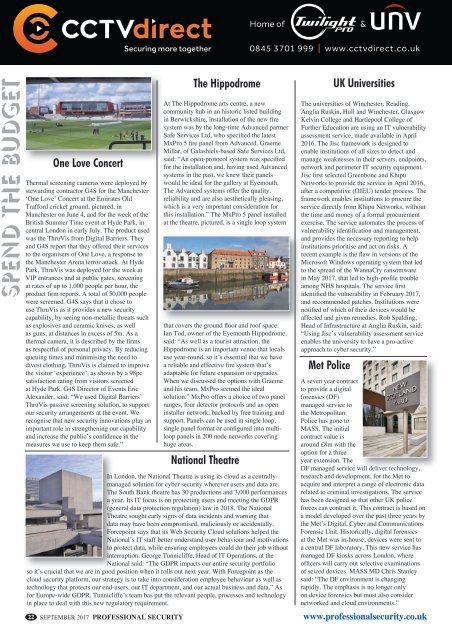Create successful ePaper yourself
Turn your PDF publications into a flip-book with our unique Google optimized e-Paper software.
spend the budget<br />
One Love Concert<br />
Thermal screening cameras were deployed by<br />
stewarding contractor G4S for the Manchester<br />
‘One Love’ Concert at the Emirates Old<br />
Trafford cricket ground, pictured, in<br />
Manchester on June 4, and for the week of the<br />
British Summer Time event at Hyde Park, in<br />
central London in early July. The product used<br />
was the ThruVis from Digital Barriers. They<br />
and G4S report that they offered their services<br />
to the organisers of One Love, a response to<br />
the Manchester Arena terror attack. At Hyde<br />
Park, ThruVis was deployed for the week at<br />
VIP entrances and at public gates, screening<br />
at rates of up to 1,000 people per hour, the<br />
product firm reports. A total of 50,000 people<br />
were screened. G4S says that it chose to<br />
use ThruVis as it provides a new security<br />
capability, by seeing non-metallic threats such<br />
as explosives and ceramic knives, as well<br />
as guns, at distances in excess of 5m. As a<br />
thermal camera, it is described by the firms<br />
as respectful of personal privacy. By reducing<br />
queuing times and minimising the need to<br />
divest clothing, ThruVis is claimed to improve<br />
the visitor ‘experience’, as shown by a 98pc<br />
satisfaction rating from visitors screened<br />
at Hyde Park. G4S Director of Events Eric<br />
Alexander, said: “We used Digital Barriers’<br />
ThruVis passive screening solution, to support<br />
our security arrangements at the event. We<br />
recognise that new security innovations play an<br />
important role in strengthening our capability<br />
and increase the public’s confidence in the<br />
measures we use to keep them safe.”<br />
The Hippodrome<br />
At The Hippodrome arts centre, a new<br />
community hub in an historic listed building<br />
in Berwickshire, installation of the new fire<br />
system was by the long-time Advanced partner<br />
Safe Services Ltd, who specified the latest<br />
MxPro 5 fire panel from Advanced. Graeme<br />
Millar, of Galashiels-based Safe Services Ltd,<br />
said: “An open-protocol system was specified<br />
for the installation and, having used Advanced<br />
systems in the past, we knew their panels<br />
would be ideal for the gallery at Eyemouth.<br />
The Advanced systems offer the quality,<br />
reliability and are also aesthetically pleasing,<br />
which is a very important consideration for<br />
this installation.” The MxPro 5 panel installed<br />
at the theatre, pictured, is a single loop system<br />
that covers the ground floor and roof space.<br />
Ian Tod, owner of the Eyemouth Hippodrome,<br />
said: “As well as a tourist attraction, the<br />
Hippodrome is an important venue that locals<br />
use year-round, so it’s essential that we have<br />
a reliable and effective fire system that’s<br />
adaptable for future expansion or upgrades.<br />
When we discussed the options with Graeme<br />
and his team, MxPro seemed the ideal<br />
solution.” MxPro offers a choice of two panel<br />
ranges, four detector protocols and an open<br />
installer network, backed by free training and<br />
support. Panels can be used in single loop,<br />
single panel format or configured into multiloop<br />
panels in 200 node networks covering<br />
huge areas.<br />
National Theatre<br />
In London, the National Theatre is using its cloud as a centrallymanaged<br />
solution for cyber security wherever users and data are.<br />
The South Bank theatre has 30 productions and 3,000 performances<br />
a year. Its IT focus is on protecting users and meeting the GDPR<br />
(general data protection regulation) law in 2018. The National<br />
Theatre sought early signs of data incidents and warning that<br />
data may have been compromised, maliciously or accidentally.<br />
Forcepoint says that its Web Security Cloud solutions helped the<br />
National’s IT staff better understand user behaviour and motivations<br />
to protect data, while ensuring employees could do their job without<br />
interruption. George Tunnicliffe, Head of IT Operations, at the<br />
National said: “The GDPR impacts our entire security portfolio<br />
so it’s crucial that we are in good position when it rolls out next year. With Forcepoint as the<br />
cloud security platform, our strategy is to take into consideration employee behaviour as well as<br />
technology that protects our end-users, our IT department, and our actual business and data.” As<br />
for Europe-wide GDPR. Tunnicliffe’s team has put the relevant people, processes and technology<br />
in place to deal with this new regulatory requirement.<br />
Met Police<br />
UK Universities<br />
The universities of Winchester, Reading,<br />
Anglia Ruskin, Hull and Winchester, Glasgow<br />
Kelvin College and Hartlepool College of<br />
Further Education are using an IT vulnerability<br />
assessment service, made available in April<br />
2016. The Jisc framework is designed to<br />
enable institutions of all sizes to detect and<br />
manage weaknesses in their servers, endpoints,<br />
network and perimeter IT security equipment.<br />
Jisc first selected Greenbone and Khipu<br />
Networks to provide the service in April 2016,<br />
after a competitive (OJEU) tender process. The<br />
framework enables institutions to procure the<br />
service directly from Khipu Networks, without<br />
the time and money of a formal procurement<br />
exercise. The service automates the process of<br />
vulnerability identification and management,<br />
and provides the necessary reporting to help<br />
institutions prioritise and act on risks. A<br />
recent example is the flaw in versions of the<br />
Microsoft Windows operating system that led<br />
to the spread of the WannaCry ransomware<br />
in May 2017, that led to high-profile trouble<br />
among NHS hospitals. The service first<br />
identified the vulnerability in February 2017,<br />
and recommended patches. Institutions were<br />
notified of which of their devices would be<br />
affected and given remedies. Rob Spalding,<br />
Head of Infrastructure at Anglia Ruskin, said:<br />
“Using Jisc’s vulnerability assessment service<br />
enables the university to have a pro-active<br />
approach to cyber security.”<br />
A seven year contract<br />
to provide a digital<br />
forensics (DF)<br />
managed service to<br />
the Metropolitan<br />
Police has gone to<br />
MASS. The initial<br />
contract value is<br />
around £8m with the<br />
option for a three<br />
year extension. The<br />
DF managed service will deliver technology,<br />
research and development, for the Met to<br />
acquire and interpret a range of electronic data<br />
related to criminal investigations. The service<br />
has been designed so that other UK police<br />
forces can contract it. This contract is based on<br />
a model developed over the past three years by<br />
the Met’s Digital, Cyber and Communications<br />
Forensic Unit. Historically, digital forensics<br />
at the Met was in-house; devices were sent to<br />
a central DF laboratory. This new service has<br />
managed DF kiosks across London, where<br />
officers will carry out selective examinations<br />
of seized devices. MASS MD Chris Stanley<br />
said: “The DF environment is changing<br />
rapidly. The emphasis is no longer only<br />
on device forensics but must also consider<br />
networked and cloud environments.”<br />
22 SEPTEMBER 2017 PROFESSIONAL SECURITY www.professionalsecurity.co.uk










